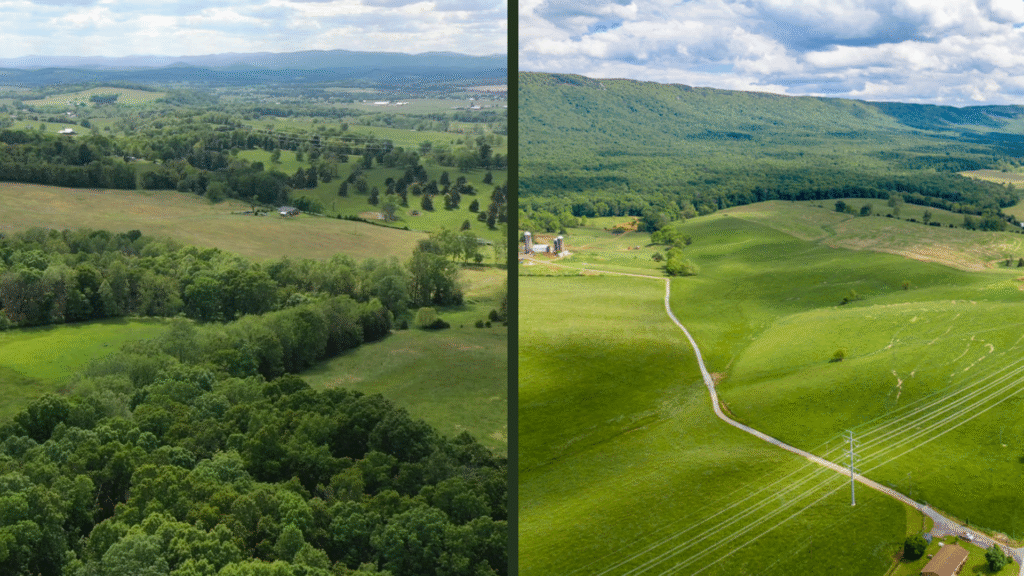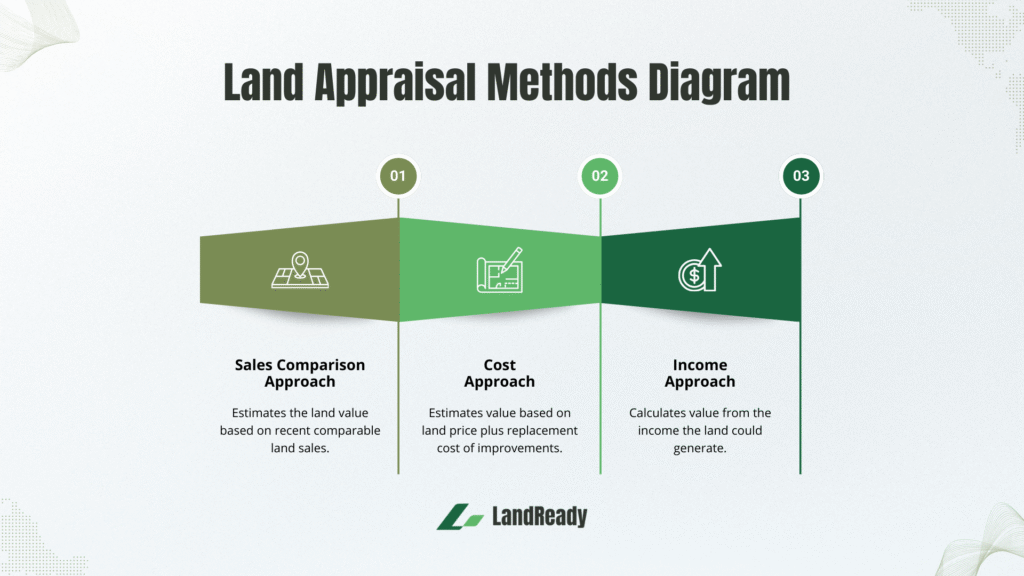Land Appraisal Virginia: What’s Your Property Really Worth?
If you need a land appraisal in Virginia, you’re dealing with one of the most complex types of property valuation. Unlike residential home appraisals where comparable sales are abundant, land appraisal requires specialized expertise and market knowledge that many general appraisers lack.
As one of only 24 Accredited Land Consultants in Virginia, I’ve guided countless property owners through understanding the land appraisal process and helped them prepare for accurate valuations—whether for financing, estate planning, or sale preparation. Understanding how Virginia land appraisal works can help you avoid costly undervaluations and ensure you receive an accurate assessment of your property’s worth.
Why Virginia Land Appraisal Is More Complex Than Home Appraisal
When you decide to sell your home, your real estate agent can pull up recent sales of similar properties in your neighborhood. But land? That’s a different story entirely.

The challenges appraisers face with vacant land:
- Vacant lots sell much less frequently than homes, creating fewer comparable sales
- Every parcel has unique characteristics that make direct comparisons difficult
- Traditional home appraisal methods often fall short for raw land
- Many appraisers have limited experience with vacant land valuation
This complexity in land appraisal can work both ways—it can hurt uninformed property owners, but it creates opportunities for those who understand how to properly prepare for the Virginia land appraisal process.
How Virginia Land Appraisal Works: The Three Main Methods
Understanding how your Virginia land appraisal will be conducted helps you highlight your property’s strengths and address potential concerns before they impact the final valuation.
Method 1: Sales Comparison Approach
This is the most common method, where appraisers look at recent sales of similar vacant land and make adjustments for differences. The challenge? Finding truly comparable sales in your immediate area.
What this means for property owners: You need to work with professionals who maintain detailed records of land sales across Virginia, not just in your immediate area. This broader database of comparables can make the difference between an accurate land appraisal and an undervaluation.
Method 2: Residual Land Value Method
This approach starts with what could be built on your land and works backward:
The Formula:
- Value of finished home in your area: $1,000,000
- Subtract construction costs: $500,000
- Subtract development costs: $100,000
- Subtract developer’s profit margin: $150,000
- Your land value: $250,000
What this means for property owners: If your area has active new construction, this method often produces the highest land appraisal values. Properties near quality new builds typically command premium prices.
Method 3: Income Approach
This method estimates the income your land could generate if developed or used productively. While less common for residential land, it can apply to larger parcels with agricultural, timber, or commercial potential.

Virginia Land Appraisal: Key Factors That Drive Values
Virginia’s diverse geography and development patterns create unique challenges for land appraisal. Two five-acre parcels in the same county can easily differ in value by $200,000 or more. Here’s what creates those dramatic differences in Virginia land appraisal:
Physical Characteristics That Add Value
- Topography: Gently rolling terrain typically commands 20-30% higher prices than steep, difficult-to-build sites
- Soil conditions: Land suitable for conventional septic systems avoids $15,000-25,000 in alternative system costs
- Shape and frontage: Regular-shaped parcels with good road frontage are significantly more valuable than narrow or irregularly shaped lots
Location Premium Factors
- Commuter access: Proximity to major employment centers can significantly increase land values
- School districts: Properties in top-rated school districts command measurable premiums
- Future development: Being in the path of growth—near planned infrastructure or quality developments—creates significant upside
Legal and Access Issues That Matter
Clean title: Properties without easement complications or access disputes sell faster and for higher prices
Road frontage type: Public road frontage is generally preferred by most buyers and lenders, though private road access can be attractive in certain markets where privacy is valued over convenience
Utility availability: Properties with existing or nearby utilities avoid $20,000-50,000+ in extension costs
Development rights: Land that can be subdivided often has dramatically higher per-acre values
Real Example: Why Acreage Alone Never Tells the Full Story
I recently reviewed appraisals for two different 5-acre parcels in Northern Virginia:
Property A sold for $250,000:
- Steep, heavily wooded terrain
- Required expensive alternative septic system
- Shared private road access
- Limited buildable area due to topography
Property B sold for $450,000:
- Gently rolling, partially cleared land
- Suitable for conventional septic system
- Public road frontage
- Mostly buildable with excellent solar exposure
Same acreage, same general area, but the land appraisal showed Property B was worth 80% more because of development advantages that weren’t immediately obvious to casual observers.
How to Prepare for Your Virginia Land Appraisal
Before Your Land Appraisal: Essential Preparation Steps
1. Get Professional Land Market Analysis Don’t guess at your property’s potential. A qualified land specialist can identify features that add value and spot potential issues before they become problems during the appraisal process.
2. Gather Supporting Documentation
- Current survey (essential for accurate valuation)
- Soil tests and perc test results if available
- Any existing approvals or permits
- Documentation of utility availability
- Clear title and access rights
3. Consider Strategic Improvements Sometimes modest investments can dramatically increase your land’s value:
- Clearing access routes to showcase building sites
- Marking boundaries to help buyers visualize the property
- Obtaining preliminary subdivision approval for larger parcels
- Securing utility connection estimates
- Getting soils feasibility letters for septic system options
- Commissioning conceptual site layouts to demonstrate buildability
Marketing Strategy That Maximizes Exposure
Target the Right Buyers Different types of land attract different buyer profiles:
- Custom home builders seek specific lot characteristics
- Developers focus on subdivision potential and approval timelines
- Individual buyers often prioritize lifestyle factors and immediate usability
Professional Photography and Presentation Land marketing requires specialized skills. Aerial photography, boundary marking, and highlighting key features like views, building sites, and access routes can dramatically impact buyer interest.
Common Seller Mistakes That Cost Money
Mistake #1: Pricing Based on Per-Acre Comparisons
“My neighbor sold 5 acres for $300,000, so my 10 acres should be worth $600,000.” This thinking ignores the unique characteristics that drive land values.
Mistake #2: Using a Generalist Real Estate Agent
Land transactions require specialized knowledge of development regulations, septic requirements, access laws, and utility extensions. Your typical residential agent lacks this expertise and may not understand factors that impact land appraisals.
Mistake #3: Inadequate Property Documentation
Buyers, lenders, and appraisers need clear information about boundaries, access rights, development potential, and any restrictions. Missing documentation kills deals and reduces offers.
Mistake #4: Timing the Market Wrong
Land markets can be seasonal and cyclical. Understanding when builders and developers are most active in your area can impact both speed of sale and final price.
The Bottom Line: Expertise Matters
Land represents a unique asset class that requires specialized knowledge to value and market effectively. The difference between working with a land specialist versus a generalist can easily mean tens of thousands of dollars in your pocket.
As an Accredited Land Consultant who specializes in Northern Virginia land sales, I’ve helped landowners achieve premium prices by:
- Accurately positioning properties based on their highest and best use
- Identifying and marketing to the right buyer segments
- Leveraging comprehensive comparable sales data across Virginia
- Navigating complex development regulations and approval processes
Ready to Understand Your Land’s True Market Value?
If you own vacant land in Northern Virginia and want to understand its current market value—whether for sale consideration, estate planning, or financial planning—I’d be happy to provide a complimentary property evaluation of your land’s potential.
This property evaluation includes:
- Preliminary market valuation based on current comparable sales
- Assessment of development potential and constraints
- Identification of factors that could increase your property’s value
- Strategic recommendations for timing and positioning a potential sale
When you’re ready to sell, you want the land specialist who:
- Holds the prestigious Accredited Land Consultant (ALC) designation—one of only 24 in Virginia
- Has completed successful subdivision development projects
- Maintains comprehensive market intelligence through continuous monitoring of land sales and new construction activity throughout Northern Virginia
- Understands both the technical and market factors that drive land values
Don’t leave money on the table. Your land’s true value might surprise you.
Important Disclaimer: This content provides general information about land appraisal practices and market factors affecting land values in Virginia. Jonathan Kennedy is a licensed real estate broker and Accredited Land Consultant, not a licensed appraiser. For formal appraisals required for lending, legal, or official purposes, consult with a state-licensed appraiser. The property evaluations and market analysis provided are based on broker expertise and current market knowledge.
Thinking about selling your land? Get started with a free, no-obligation property evaluation.
Jonathan Kennedy is an Accredited Land Consultant and licensed real estate broker specializing in Northern Virginia land sales and development consulting. With extensive experience in land transactions and development, he helps landowners understand and maximize the value of their most important asset. Jonathan is not a licensed appraiser and does not provide formal appraisals – he provides property evaluations and market analysis to help property owners understand current market conditions and positioning strategies.
